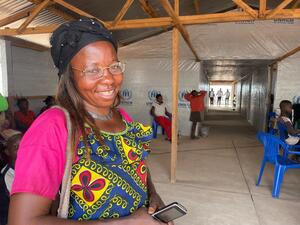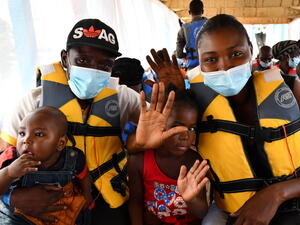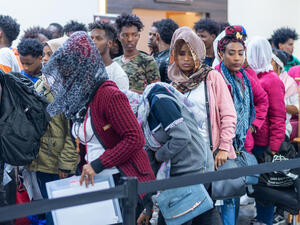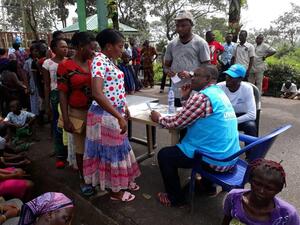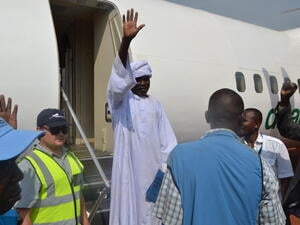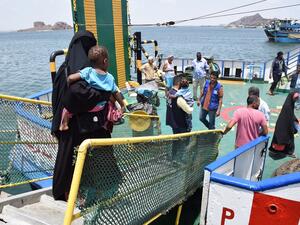Return home now possible for South Sudan's refugees in Uganda
Return home now possible for South Sudan's refugees in Uganda
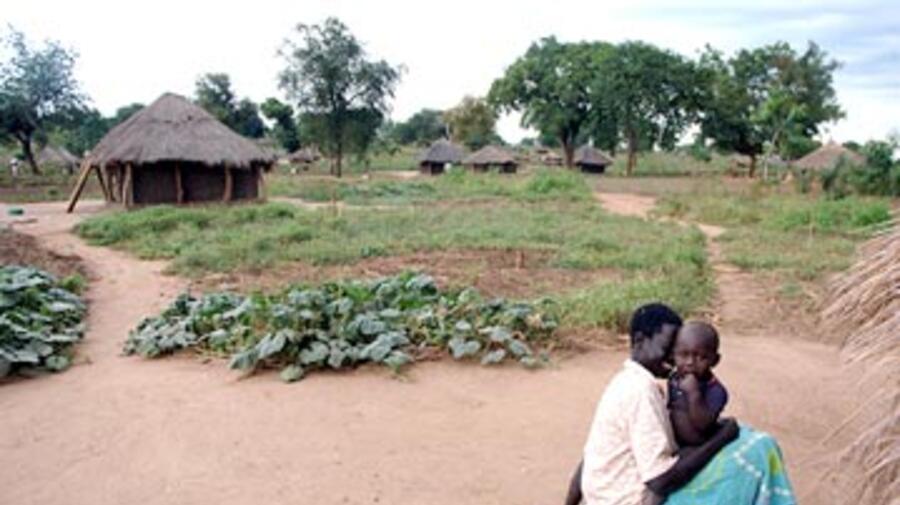
A Sudanese refugee holds her baby outside her home in the vast Rhino Camp, Uganda.
KAMPALA, Uganda, Mar 27 (UNHCR) - Thousands of southern Sudanese refugees in northern Uganda - representing over half the total number in exile - will be able to go home after a repatriation agreement was signed in the Uganda capital on Monday.
The agreement, between UNHCR and the governments of Uganda and Sudan, allows for the repatriation of southern Sudanese refugees from April onwards providing the current security situation improves.
Last week, UNHCR suspended its repatriation programme from the Democratic Republic of the Congo (DRC) and the Central African Republic (CAR) following heavy fighting in Yambio and an attack on a UNHCR compound in Yei in which a guard was killed and another guard and a UNHCR staff member seriously wounded.
This agreement affects some 168,000 Sudanese refugees who live in camps in northern Uganda. They make up the largest concentration of Sudanese refugees anywhere and represent 80 percent of Uganda's total refugee population.
Since a peace deal was signed in 2005 ending the 21-year civil war between the north and the south of the country, returning home has become an increasing possibility for the thousands of people who fled during the long years of bloody conflict. In total, there are still 358,000 Sudanese refugees in neighbouring countries, including Kenya, Ethiopia, CAR, DRC and Egypt.
The tripartite agreement signed in Kampala sets the legal framework needed to coordinate, manage and facilitate the voluntary repatriation of refugees who have expressed a desire to go back to their homes. UNHCR is to facilitate the repatriation operation to South Sudan.
"The Sudanese need to help themselves to rebuild their country," said UNHCR's Sudan operation director Jean-Marie Fakhouri, at the signing ceremony in Kampala. Directly addressing a group of refugees who were present at the ceremony, he added: "You will be the engines of development in Sudan and therefore you are needed to go back."
This agreement is the fifth of its kind after similar ones signed with Kenya last December, as well as with CAR, DRC and Ethiopia earlier this year.
Around two-thirds of the refugees affected originate from the Western, Central and Eastern Equatoria states of southern Sudan, while the remaining third are mostly from Upper Nile, Bahr el Ghazal and Jongley states.
"We should call our brothers to return to Sudan," said Brigadier Aleu Ayieny Aleu, the Sudanese Minister of Interior. "There is water to make your land a green land and you will be able to feed yourself," he told refugees at the Kampala ceremony.
In January this year, UNHCR and the Ugandan authorities began registering the refugees in the districts of Arua, Moyo, Hoima and Masindi. So far, more than 29,000 refugees have been registered awaiting repatriation this year. Upon arrival in South Sudan, refugees receive repatriation kits with blankets, sleeping mats or mattresses, plastic sheets, mosquito nets, jerry cans, kitchen sets, water buckets, soap and food from the World Food Programme to help them start their lives again.
The hopes of the Sudanese refugees wishing to return and reintegrate successfully in their home communities, however, could be dashed by the lack of resources for UNHCR's Sudan repatriation operation. The refugee agency launched an appeal for 2006 for US$ 63 million in order to adequately support voluntary repatriation, return and reintegration operations in South Sudan for refugees but so far only US$ 10.2 million has been received.
"Peace in Sudan might look like the end of the road," said Fakhouri at the ceremony. "On the contrary, this is the beginning of the road and we need the donors to support the refugees to go back to their country and rebuild it."
By Roberta Russo in Kampala, Uganda

